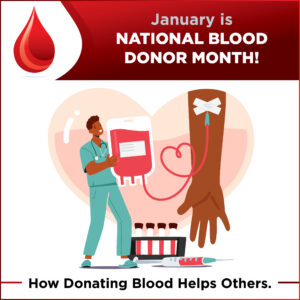The month of January is designated as National Blood Donor Month in the United States. Due to holiday celebrations, inclement weather, and cold and flu season, the winter months are often a time of reduced donations and an increased risk for blood shortages. National Blood Donor Month celebrates blood donors during this critical time and reminds people of the importance of donating blood.
Blood donations across the country have dropped significantly over the last 20 years. The American Red Cross is even currently facing an emergency blood shortage. The shortfall can have a huge impact on the availability of blood products available, especially for emergency needs.
 Are You Eligible to Donate?
Are You Eligible to Donate?
In most states, individuals who are 17 years of age, weigh at least 110 pounds, and are in generally good health, may be eligible to donate blood.
A blood donor card or driver’s license, or two other forms of identification, may be required.
 Why Donate Blood?
Why Donate Blood?
A blood donation is a simple act that can help others in need. A smaller donation typically only takes a few minutes. Or, in under an hour an eligible individual can donate a full unit of blood. Donations can then be separated into individual components that could ultimately help save multiple lives.
Many people who donate say they do so because they enjoy knowing that they can help people, and enjoy supporting their community, local hospital and the Red Cross.
 How Donating Blood Helps Others
How Donating Blood Helps Others
• From one unit of blood:
• Red blood cells can be extracted and used to treat patients who have lost blood due to trauma or those who are recovering from a surgical procedure.
• Plasma, the liquid part of blood, can be given to patients with requiring treatment to improve blood clotting.
• Platelets, a third component of blood, helps clot the blood when cuts or other wounds occur. These are also often used to help cancer patients or those undergoing organ transplants.
• Anti-hemophilic factor (AHF) can also be used for clotting factors.
 Research Your Local Donation Options
Research Your Local Donation Options
Throughout the year there may be multiple opportunities to donate blood in any community. Blood drives can be held by the American Red Cross, sometimes at public events, or through partnerships with local hospitals, businesses or schools. Visit your city or county website, local hospital event listings, the Red Cross website, or other local resources to find out when and where blood drives may be scheduled to occur in your community!
Sources: Red Cross, AABB
